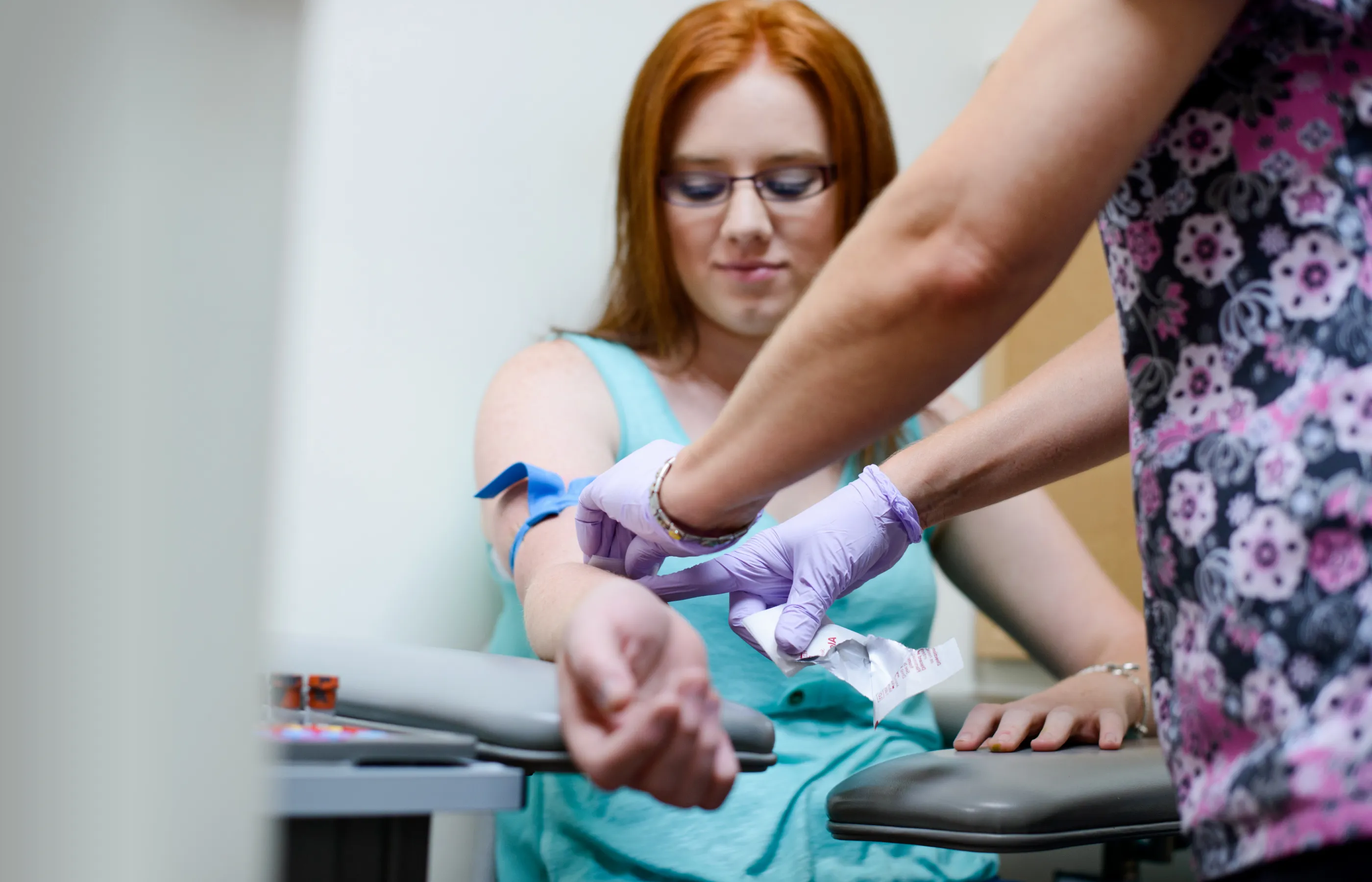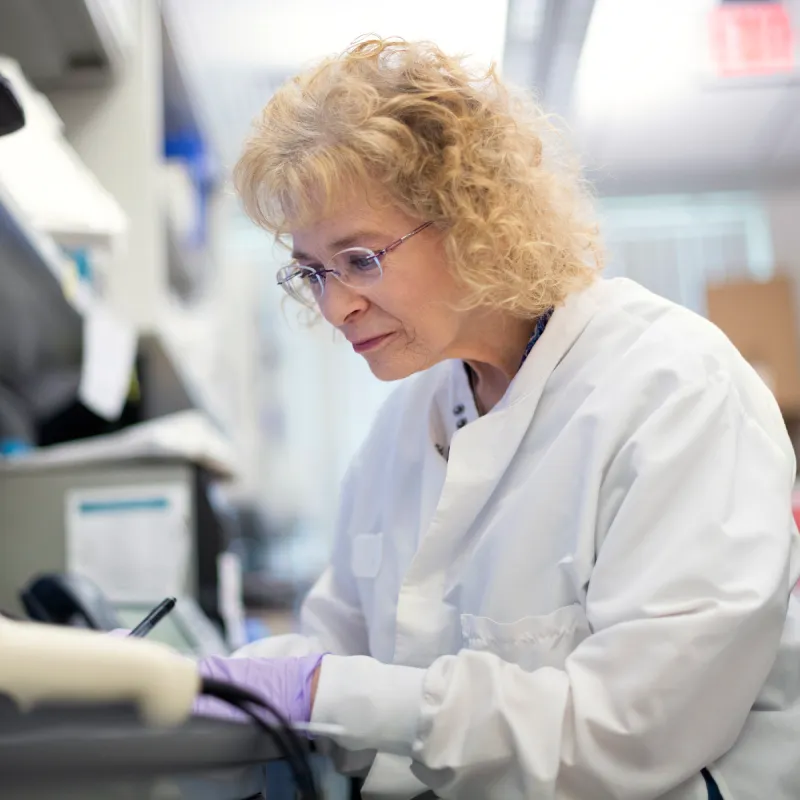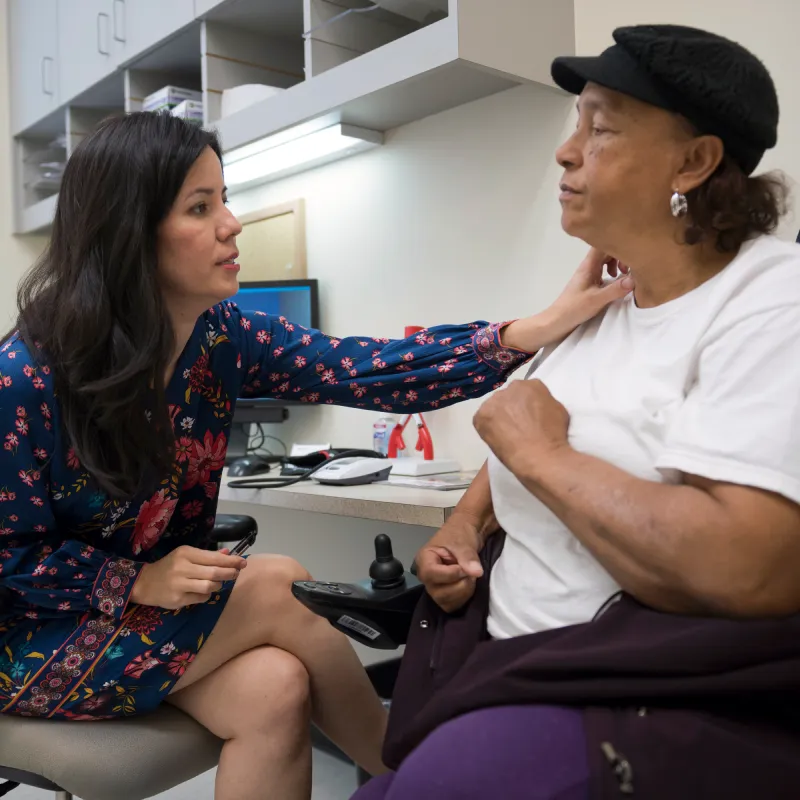Blood Clot Disorders
Expert care. Effective therapies.
Receive exceptional care and treatment from our compassionate, dedicated team of hematologists and blood disorder specialists. Our highly rated programs, support services and treatment options help you improve your daily life while managing your condition. At Novant Health Hematology, you’ll work with a team of experienced hematologists who diagnose and treat even the rarest forms of bleeding disorders based on the latest research.

Understanding Blood Clots
When you experience an injury, your body normally forms a blood clot to slow and stop the bleeding. Venous thromboembolism (VTE), a blood clot disorder, occurs when your body forms a clot in your vein without an injury. You may be born with VTE or you could develop the condition following an injury or other illness.
VTE refers to both deep vein thrombosis (DVT) and pulmonary embolism (PE). These serious conditions are often underdiagnosed, but also are preventable and treatable.
What causes blood clotting disorders?
Your risk for experiencing venous thromboembolism (VTE) increases with age, obesity and a strong family history of VTE. Other conditions putting you at higher risk include:
- bone fractures, severe muscle injury, major surgery
- bed confinement after surgery or a medical condition and limited movement (like wearing a cast or sitting for a long time)
- increased estrogen (birth control pills, pregnancy, estrogen replacement therapy after menopause)
- health conditions including heart or lung disease, cancer, cancer treatment and inflammatory bowel disease
- central venous catheters
You may inherit a condition that puts you at higher risk for forming blood clots. Fortunately, the more severe conditions (protein S, Protein C and Antithrombin deficiency) are rare and the more common conditions (Factor V Leiden and Prothrombin Gene mutation) are less risky.
Should I be tested for VTE?
In general, you do not need to be screened for VTE unless you have a history of blood clotting for a hereditary condition. Testing for these conditions also is not a necessary part of an initial evaluation of VTE. Test results will be falsely abnormal in the case of an acute clot or during anticoagulation therapy. A test may be helpful at the end of therapy to assist with determining the length of your treatment.
Types of Blood Clotting Disorders

What to expect with blood clot treatment.
Whether you experience a blood clot for the first time or have an inherited condition you need to manage, you’ll want expert care from a team of specialists who have access to the latest research and treatments. At Novant Health Hematology, you’ll be supported by a team of compassionate experts who work closely with you to diagnose your condition and develop an individualized care plan.
Preventative treatment
To prevent blood clotting and lower your risk of VTE, you may receive a low-dose anticoagulation medication following surgery, during a prolonged hospital stay or in some other high-risk situations. Sequential compression devices (SCD), cuffs worn on the legs that inflate and deflate to push blood through the veins, also reduce the risk of blood clots if you are confined to the bed. Movement is another great preventive measure. Getting up and moving around as soon as your provider allows can go a long way toward preventing VTE.
DVT & PE treatment
If you are diagnosed with DVT or PE, you will likely be treated with full dose anticoagulation therapy. These drugs keep the clot from continuing to grow and embolize. Anticoagulation drugs are sometimes called “blood thinners,” but they do not actually “thin” the blood. They make the blood less likely to clot and keep clots from growing.
Standard treatment with anticoagulation therapy for a DVT and PE lasts 3 to 6 months. By the end of your anticoagulation therapy, the clot matures and becomes firmer. A mature or chronic clot is much less likely to progress or embolize to the lung.
Sometimes you may need to undergo treatment to break up clots. Our vascular specialists and interventional radiologists administer these aggressive treatments for life or limb-threatening situations. While potentially lifesaving, “thrombolytic” therapies also can put you at risk of bleeding and other dangerous complications compared to standard anticoagulation medications. Our team of experts will review the risks and benefits of these treatments to determine the best care for you.
If you are at high risk for another blood clotting event, you may benefit from taking anticoagulation medications for a longer period of time. We’ll work closely with you to discuss your options and understand your preferences based on careful risk assessment.

Access Lifespan Blood Disorder Treatment
Managing a non-malignant blood condition is often a lifetime commitment. Receive compassionate care at a Novant Health from birth through adulthood in our CDC-designated Hemophilia Treatment Centers (HTC) at Novant Health locations and St. Jude Affiliate Clinic at Novant Health Hemby Children’s Hospital. HTCs are multidisciplinary comprehensive clinics providing holistic care for bleeding disorders. Your team will include visits with a hematologist, social worker, pharmacist, and physical therapist.

Understanding Your Risks
Understanding your underlying condition can help us better treat your blood disorder. Novant Health Hematology offers genetic testing to help identify the condition that may be causing you to experience abnormal platelet production. We also offer pre-conception counseling to help minimize issues for you and the fetus during your pregnancy or delivery. Our genetic counseling team can talk with you about options for testing and whether it is right for you.
Why Choose Novant Health?
Our highly skilled providers have devoted their careers to providing you with remarkable hematology care. We’re here for you with a team of experienced doctors, nurses, geneticists, and other blood specialists to provide compassionate support and the multidisciplinary care you need. We stay on top of the latest research to ensure you have access to the most advanced treatments to manage your blood condition and live life to the fullest.

Advancements in hemophilia treatments and medicines for blood conditions can give you a new way to fight your disease. Novant Health hematologists participate in studies and programs dedicated to helping you live better with or overcome blood disorders. Through our participation in Community Counts (CDC), a public health monitoring program funded by the CDC division of blood disorders, we share real-world data to help pioneer new and better treatments.

You're not alone on your healthcare journey. At Novant Health, you’ll have all the resources you need to tackle your blood disorder – from birth through adulthood. We take a collaborative approach by working together with experts from different specialties to support you every step of the way. When needed, your hematologist will collaborate with experts in gastroenterology, physical therapy, cardiology, OB-GYN and more. Our social workers and nurse coordinators will provide added support to ensure you get the services you need to thrive.

Managing a non-malignant blood condition is often a lifetime commitment. You’ll receive compassionate care at a Novant Health federally designated Hemophilia Treatment Center (HTC) for adults. HTCs are multidisciplinary comprehensive clinics providing holistic care for bleeding disorders. Your care team will include visits with a hematologist, social worker, pharmacist, and physical therapist.

